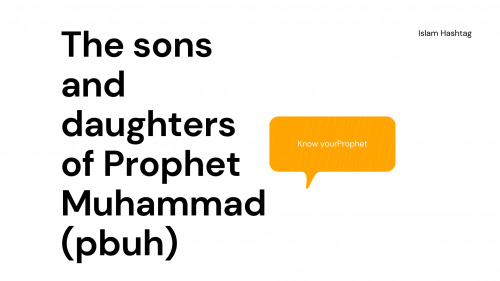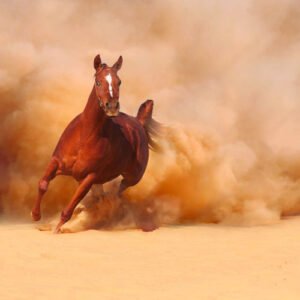Let us learn about the sons and daughters of Prophet Muhammad ( Sallalahu alaihe wa sallam).
Ramadan Offer
The sons of Prophet Muhammad( Sallalahu alaihe wa sallam).
Nabi ( Sallalahu alaihe wa sallam) had three sons and four daughters. All the children were born from Hadhrat Khadija (radi allahu anha) , except his son Ibrahim. Qaasim was his first son, born to him before Nubuwwat. He passed away when he was two. Abdullah, the second son, was born after Nubuwwat. He was also called Tayyab and Taahir. He also passed away in his childhood. At the time of his death, the Quraish were overjoyed and said: “Muhammad has no son, and will therefore have no one after him. His name will also die with his death.” It was on this occasion that Surah Al-Kausar was revealed by Allah Ta’ala. It said:
إِنَّآ أَعْطَيْنَـٰكَ ٱلْكَوْثَرَ
فَصَلِّ لِرَبِّكَ وَٱنْحَرْ
إِنَّ شَانِئَكَ هُوَ ٱلْأَبْتَرُ
(0 Prophet,) surely We have given to you Al-Kauthar (a river in Paradize).So, offer salah (prayer) to your Lord, and sacrifice.Surely it is your enemy whose traces are cut off.(S108: V1 to 3)
Even after more than fourteen hundred years, today there are millions who are proud to be connected to Nabi ( Sallalahu alaihe wa sallam) in love and devotion. Ibrahim, the third son and last child, was born in Madinah Munawwarah in 8 A.H. Nabi’s slave woman Maariyah Qibtiyyah (radi allahu anha) gave birth to him. Nabi ( Sallalahu alaihe wa sallam) performed the Aqeeqah ceremony on the seventh day of his birth. Two lambs were slaughtered, the child’s head was shaved by Hadhrat Abu Hind Bayazi , silver in weight equal to his hair was spent in charity and the hair was buried. Nabi ( Sallalahu alaihe wa sallam)said: “I am naming my child after the name of my forefather Ibrahim .” This son also passed away, on the 10th Rabi-ul-Awwal, 10 A.H., when he was only 18 months old. Nabi then said: “Allah Ta’ala has arranged a heavenly nurse to look after Ibrahim in the gardens of Jannah.”
The Daughters of Prophet Muhammad (pbuh)
(1) Hadhrat Zainab (radi Allahu anha)
Zainab (radi allahu anha) was the eldest daughter of Nabi ( Sallalahu alaihe wa sallam) and was born in the fifth year of his first marriage, when he was thirty. She accepted Islam and was married to her cousin Abul Aas bin Rabi. The story ofher moving to Madinah Munawwarah and her getting wounded by the Quraish has already been given in the early part of this chapter. She suffered for a long time from that wound and passed away because of it in the beginning of 8 A.H. Her husband later accepted Islam and joined her in Madinah Munawwarah.
She had a son Ali , and a daughter Umaamah. Ali passed away during the lifetime of Nabi . This same Ali (radi allahu anhu )was the person who sat with Nabi on the camel’s back at the time of his victorious entry into Makkah Mukarramah. We often read in the Hadith about a little girl riding on the back of Nabi as he bowed down in Salaah. This was Umaamah, Zainab’s daughter. She lived for a long time after the death of Nabi . Hadhrat Ali (radi allahu anhu ) married her on the death of Hadhrat Faatimah (radi allahu anha) his first wife. It is said that Hadhrat Faatimah at the time of her death had said that Hadhrat Ali (radi allahu anhu )should marry her. She had no children from Hadhrat Ali . After Hadhrat Ali’s death she was married to Hadhrat Mughirah bin Naufal , from whom she had one son named Yahya. She passed away in 50 A.H.
(2) Hadhrat Ruqayyah (radi Allahu anha)
Ruqayyah (radi allahu anha) was born three years after the birth of Hadhrat Zainab (radi allahu anha) , when Nabi was 33 years old. She was married to Utbah, the son of Abu Lahab, Nabi’s uncle, but had not yet started living with him when Surah Al-Lahab was revealed. Abu Lahab called his sons Utbah and Utaibah (to whom Ummu Kulsum, another daughter of Nabi was married), and said to them: “Unless both of you divorce the daughters of Muhammad, I am not going to see your faces.” They divorced their wives. Later, when Makkah Mukarramah was conquered by the Muslims, Utbah accepted Islam. After thisdivorce, Hadhrat Ruqayyah was married to Hadhrat ‘Usmaan (radi allahu anhu ) The couple shifted to Abyssinia twice. Nabi had announced to the Sahaabah that he was waiting to receive Allah’s command for moving to Madinah Munawwarah. The Sahaabah started moving to Madinah Munawwarah even before Nabi’s Hijrat. Hadhrat Usmaan and Hadhrat Ruqayyah had also shifted to Madinah Munawwarah before Nabi .
At the time of Badr, Ruqayyah (radi allahu anha) was ill (she later passed away of this illness). Hadhrat ‘Usmaan (radi allahu anhu ) was therefore asked by Nabi to stay in Madinah Munawwarah and look after her. The news about the victory in Badr was received in Madinah Munawwarah when the people were returning from Ruqayyah’s funeral. Nabi was not present at her burial. A son was born to Hadhrat Ruqayyah (radi allahu anha) in Abyssinia. He was named Abdullah and lived after his mother but passed away in 4 A.H. when he was six years old.
(3) Hadhrat Ummu Kulsum (radi Allahu anha)
Kulsum (radi allahu anha) is the third daughter of Nabi ( Sallalahu alaihe wa sallam). She was married to Utaibah, the son of Abu Lahab, but had not yet started living with him when Utaibah divorced her after the revelation of Surah AlLahab, as has already been mentioned. After divorcing her, Utaibah came to Nabi and said the rudest words to him. Nabi cursed him by making this dua: “O, Allah! Order one of your dogs to punish him.” Abu Taalib, who had also not accepted Islam, was shocked at the curse and said to Utaibah; “You have no escape now.” Once, Utaibah and Abu Lahab went with a group of people to Syria. Abu Lahab, in spite of his kufr and hatred, said to the people: “I am afraid of Muhammad’s curse.
Everybody should take care of my son.” They happened to camp at a place where there were many lions. The people had piled up their entire luggage and Utaibah was made to sleep on top of the pile, while the rest of the people slept around the pile. A lion came at night; and smelt all the people sleeping around the pile. The lion then jumped over the people and reached Utaibah. He screamed, but the lion had bitten off his head from his body. It is extremely necessary that we avoid being rude to the people dear to Allah Ta’ala. Nabi has reported
Allah Ta’ala as saying مَنْ عَادَى لِي وَلِيًّا فَقْد آذَنْتهُ بِالْحَرْبِ He who insults my friends I announce war with him.”
After the death of Hadhrat Ruqayyah (radi allahu anha), Hadhrat Ummu Kulsum (radi allahu anha)was married to Hadhrat Usmaan in Rabi-ul-Awwal, 3 A.H. Nabi said: “I have given Ummu Kulsum in marriage to Usmaan by Allah’s command.” She passed away in Shaaban, 9 A.H. without having any children. After her death, Nabi is reported to have said: “Even if I had one hundred daughters, I would have given all of them in marriage to ‘Usmaan one after the other, if each one had passed away.”
(4) Hadhrat Faatimah (radi Allahu anha)
Hadhrat Faatimah (radi allahu anha), the fourth and the youngest daughter of Nabi ( Sallalahu alaihe wa sallam) who will be the leader of the women in Jannah, was born in the 1st year of Nubuwwat, when he was 41. It is said that the name Faatimah (meaning safe from fire) was revealed by AllahTa’ala. She was married to Hadhrat Ali in 2 A.H. She began to live with him seven and a half months later. She was about fifteen and Hadhrat Ali was twenty one at the time of their marriage. Of all the daughters, she was the most beloved of Nabi . Whenever he went out on a journey, she was the last one to meet him and when he returned home, she was the first one to meet him. When Hadhrat Ali (radi allahu anhu ) was thinking of marrying Abu Jahal’s daughter, she was very upset and mentioned her grief to Nabi ( Sallalahu alaihe wa sallam). Nabi ( Sallalahu alaihe wa sallam) said to Hadhrat Ali : “Faatimah is a part of my body. Whoever upsets her upsets me.”
Hadhrat Ali gave up the idea of the second marriage during her lifetime. After her death, he married her niece Umaamah , as we have already read in the previous pages. It was about six months after the death of Nabi ( Sallalahu alaihe wa sallam) that Hadhrat Faatimah fell ill. One day, she said to her maid: “I want to take a bath. Arrange some water for me.” She took a bath and changed her clothes. She then asked her bed to be placed in the middle of the room. She laid herself down on the bedding, with her face towards the Qiblah, with her right hand under her right cheek, she said: “I am now going to pass away.” The next moment she was gone. Nabi’s family continued and shall Insha Allah continue through her children. She had three sons and three daughters. Hadhrat Hasan (radi allahu anhu ) and Hadhrat Husain (radi allahu anhu ) born in the second and the third year respectively, after marriage. Muhassan , the third son, was born in 4 A.H., but passed away in childhood. Ruqayyah, her first daughter, also passed away in childhood and has not been mentioned much in history.
Her second daughter Ummu Kulsum, who was first married to Hadhrat Umar (radi allahu anhu ) , had one son Zaid and one daughter Ruqayyah. After Hadhrat ‘Umar’s death, Hadhrat Ummu Kulsum (radi allahu anha) was married to Aun bin Ja’far , but had no children from him. After his death, his brother Muhammad bin Ja’far married her. A daughter was born to them, who passed away in childhood. Even Muhammad passed away in her lifetime and she was then married to the third brother, Abdullah bin Ja’far, from whom she had no child. She passed away as Abdullah’s wife. Her son Zaid also passed away the same day and they both were carried for burial at the same time. Zainab, Hadhrat Fatimah’s third daughter, was married to Abdullah bin Ja’far and had two sons Abdullah and Aun from him. After her death, he married her sister Hadhrat Ummu Kulsum (radi allahu anha). Hadhrat Ali (radi allahu anhu ) had many other children from his wives after Faatimah (radi allahu anha) . It is stated that he had as many as thirty-two children. Hasan (radi allahu anhu ) had fifteen sons and eight daughters, while Husain (radi allahu anhu ) was the father of six sons and three daughters.
Reference : Stories of sahaba by Shaikhul hadith Maulana Zakarriya Khandalvi
Discover more from Islam Hashtag
Subscribe to get the latest posts sent to your email.





